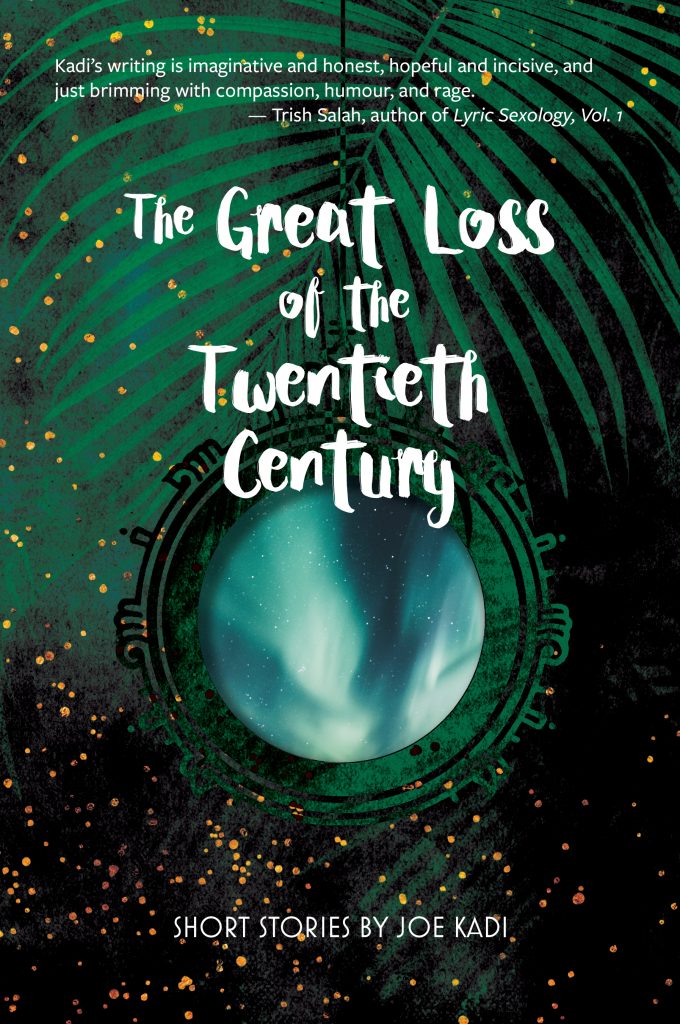Joe’s New Book
The Great Loss of the Twentieth Century


The Great Loss of the Twentieth Century
The Great Loss of the Twentieth Century overflows with laughter, tears, struggle, and connection. Joe Kadi’s Human and Spirit characters—activists and filmmakers, musicians and Earth lovers, survivors and the formerly homeless—grapple to make sense of the world. They find rage, healing, and unexpected help from many corners of the Cosmos.
Book Cover Art by Liz Kalloch
Praise
Joe Kadi’s linked short stories reveal the kinship between living and dead, the Lord God of Birds and Men Who Cry, and the nature of emotional terror and its aftershocks, rippling through time to create a map of medicines: the salve of friendship, a wide lake, and, throughout, queer kinship with creatures great and small.
Zeyn Joukhadar, author of The Thirty Names of Night, and Map of Salt and Stars.
With brilliance and humor, Joe Kadi tells stories about working-class and queer Arabs, about Mother Earth, healing from trauma, and a quirky universe of spirits. His words will make you laugh, cry, and ponder the world anew. This book feels to me like a new best friend.
Eli Clare, author of Brilliant Imperfection: Grappling with Cure
The Great Loss of the Twentieth Century is a collection of stories that will first sear a hole in your heart, next make you realize that the hole was already there, and finally show you how to embrace it—on your own terms—on a path toward radical healing and love. These stories communicate the complexity of lived violence and intergenerational trauma with lyrical precision. Deftly woven together, they also uplift the beauty of—and even joy in—moving through pain, all the while celebrating the fiery spirit it takes to reclaim oneself in the midst of it.
Amira Jarmakani, author of An Imperialist Love Story: Desert Romances and the War on Terror and co-editor of Sajjilu Arab American: A Reader in SWANA Studies.
These stories reach out to you from a realm where friends really do exist, a world that knows that we humans are in great need, and offer help. They ask, teach, invite insight, nourish, break your heart, and make you laugh. Each story stands on its own – but, intricately patterned, as a whole the collection sets up beautiful resonances and threads between stories and then out into broader context they reference. We need more books like this, where abuse, the ongoing attempted destruction of the earth, the violence of capitalism may be parts of our stories, parts which so many people want us to forget or ignore or pretend never happened. And we need more books like this where that’s not the end of our stories, where there are ways to go on through fire, friendship, and connecting with a world of care and community. The seen and unseen beings in these stories will lift your heart and spirit.
Alexis Shotwell, author of Against Purity: Living Ethically in Compromised Times
Joe Kadi’s The Great Loss of the Twentieth Century wends between the intertwined lives (and afterlives) of people navigating the large and intimate, taken for granted violences of the world we live in, and conjures with tenderness, wit and imagination a Spirit World beyond. Whether applying for an apartment after years of parental abuse and psychiatric confinement, enduring terrorist jokes and sexual violence, attempting to date post-transition or attending a deliberately interminable Training Intensive for Helping Humans in Need, the characters in Kadi’s stories stumble, puzzle through, resist, get high, fall in love, watch StarTrek, and sometimes, just sometimes, triumph against all odds. Kadi’s writing is imaginative and honest, hopeful and incisive, and just brimming with compassion, humour, and rage.
Trish Salah, author of Lyric Sexology, Vol. 1.
Read an Excerpt
This is an excerpt from “Running,” the second story in The Great Loss of the Twentieth Century:
All insecurity vanishes as Jameelah participates in the large, informal dance formation, her favourite aspect of the riot grrrl scene. The highlight of the evening bursts on the crowd when Burning Urine debuts their new song, a treatise on rising temperatures. Jameelah has a proprietary interest, having supplied Jean with the closing line in the chorus. Jean expressed satisfaction with the result: another three-chord song with a memorable story. “Just like country-western music,” Jameelah remarked sweetly. Jean swatted her on the arm. “Damn it, Haddad, you’re too smart for your own good.” After her solo, Jean inspires the crowd to sing the chorus. “Let’s keep Mother Earth cool/stop burning fossil fuel/let’s help Mother Earth heal/keep us on an even keel.” They chant for a good 10 minutes until the lead guitar player breaks into a spontaneous, rip-roaring solo. The sweating, dancing crowd in an ugly warehouse turns into a thing of beauty, a joy forever. Every creature present beams. Three hundred individuals transmogrify into one entity brimming over with delight.
Three encores later, the place shuts down. Jameelah waits on a wooden bench at the back of the room until the familiar train bears down on her. “I had a few invitations tonight,” Jean informs Jameelah, “but as a musician, I can’t sleep with just any of my fans. I have to set limits.”